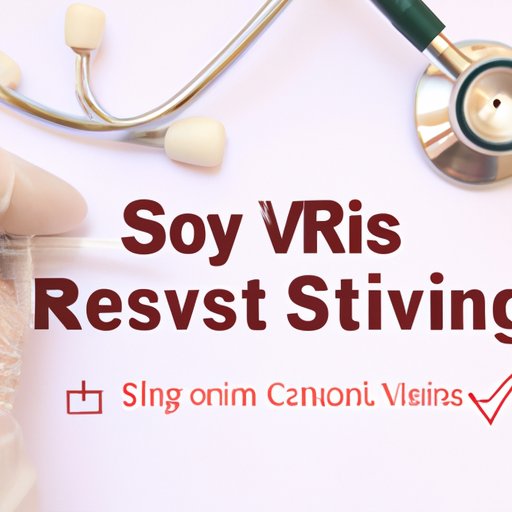I. Introduction
Respiratory Syncytial Virus (RSV) is a common virus that can cause respiratory illnesses in people of all ages, but particularly in infants and older adults. Testing for RSV is critical in diagnosing the virus, guiding treatment, and preventing its spread. In this article, we explore the various aspects of RSV testing and share insights on when testing is needed, the available types of tests, and how to prevent and contain outbreaks.
II. Overview of RSV and Importance of Testing
RSV is a viral infection that primarily affects the respiratory system. It spreads when an infected person coughs or sneezes, and the virus particles land in another person’s eyes, nose, or mouth. RSV is highly contagious, and outbreaks can occur in crowded settings, such as daycare centers and hospitals. Testing for RSV is crucial in diagnosing the disease and preventing its spread to others who may have weakened immune systems.
There are several methods for RSV testing, including rapid antigen testing, polymerase chain reaction (PCR) testing, and viral culture. Rapid antigen testing involves testing a sample from the nasal passages for the presence of RSV antigens. PCR testing detects viral genetic material in the sample, while viral culture involves attempting to grow the virus from the sample. A healthcare professional can help determine which method of testing is best for a particular patient.
III. Symptoms of RSV and When Testing is Needed
The symptoms of RSV can vary in severity depending on a person’s age and overall health. In children, RSV can cause mild to severe symptoms, including a runny nose, cough, fever, and wheezing. In adults, symptoms usually resemble the common cold and typically clear up in a week or two.
If a person exhibits symptoms of RSV and is at high risk of developing complications, such as infants, older adults, or those with weakened immune systems, testing for the virus is necessary. For those who are otherwise healthy, testing may not be needed, and rest, hydration, and over-the-counter medications may be sufficient to alleviate symptoms.
IV. Types of RSV Tests
The available types of tests for RSV diagnosis vary in their accuracy, speed, and cost. Rapid antigen testing is less sensitive than PCR testing but produces results within hours. PCR testing is more sensitive than antigen testing and can detect the virus even if it is present in low levels. Viral culture is the slowest method of testing, as it can take several days for results to come back. However, it is the most reliable test for definitive diagnosis.
The tests may be conducted on samples obtained from the nasal passages, nasopharynx, or throat. A healthcare professional can assist in determining the most appropriate sampling method and testing type.
V. RSV Testing for High-Risk Populations
Infants, older adults, and those with weakened immune systems are at higher risk of developing severe complications from RSV. Testing for these populations is critical in diagnosing the virus and guiding treatment. Healthcare providers may obtain samples from these individuals and send them for testing in a laboratory.
VI. RSV Testing in Clinical Settings
Healthcare professionals undertake testing for RSV in clinical settings such as hospitals, clinics or healthcare centers. They may use rapid antigen tests, PCR testing, or viral culture to diagnose the virus. The tests are conducted by obtaining samples from the patient’s nasal passages or throat. The samples are sent to the lab for testing, and the results are interpreted by healthcare professionals in conjunction with additional clinical data.
VII. DIY RSV Testing
While several do-it-yourself (DIY) tests are available in the market for RSV testing, it is recommended that individuals seek professional testing. DIY tests carry a risk of inaccurate results, and the interpretation of results may be challenging. In contrast, healthcare professionals are trained to obtain and interpret accurate results and guide appropriate treatment.
VIII. RSV Testing and Prevention
Preventing the spread of RSV is critical in reducing the harm caused by the virus. Prevention measures include frequent hand washing, avoiding close contact with those who are ill, and cleaning surfaces that may be infected by the virus.
Testing for RSV can also be used to contain outbreaks in settings such as daycare centers and hospitals. When an outbreak is suspected, healthcare professionals can conduct RSV testing and isolation measures to prevent further spread of the virus. Vaccines for RSV are in development, and frequent testing is essential to monitor their effectiveness and safety in clinical trials.
IX. Conclusion
RSV is a common but potentially dangerous viral infection that can affect people of all ages. Testing for RSV is critical in diagnosing the virus, guiding treatment, and preventing its spread. Understanding the available tests, when testing is necessary, and how to prevent outbreaks is crucial to stay safe from RSV. For more information and guidance on RSV testing, readers can consult their healthcare providers or visit reputable healthcare websites.
